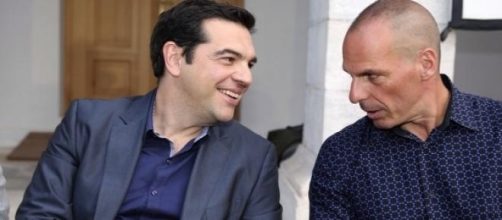Thursday's European mini-summit could have gone worse for Greek PM Alexis Tsipras. When this meeting was announced, many people in Greece recalled another summit. It was 2011 and the G20 was taking place in Cannes. Greece was already under the Memorandum effect and it was more than obvious than people were fed up with it. However, it was also obvious that Greece was in need of a second bail-out program, a decision that the then Greek PM George Papandreou didn't seem willing to take. Instead, he thought that a good idea would be to let the people decide if they would accept a second package so as to remain in the euro.
For his European counterparts, this idea, which was announced unexpectedly, was at least disastrous since it would directly dispute the euro and the Eurozone. When Papandreou arrived in Cannes and joined the round table along with Merkel and Sarkozy he understood why sometimes one has to think twice. The night was described as Papandreou's personal Waterloo and resulted in Sarkozy behaving like a bull in a china shop and Angela Merkel experiencing a nervous breakdown in the beautiful scenery of Cannes.
Fortunately, last Thursday did not bring back this nightmare for anyone. However, again it did not have actual results for Greece apart from promises and good intentions. Prime Minister Tsipras managed to earn a little more time but he was not given any money in return so as to help the country take a deep economic breath.
Greece has been on the EU's menu for eight weeks now and never before has this relationship been so difficult to manage. Europe is still trying to accept the fact that the new Greek government does not share their views on how Greece could recover from the crisis.
On the other hand, the Greek government has still not realised that they got elected and that the time has come for them to govern and stop campaigning. On Monday, Tsipras is going to pay his first visit to Berlin and have his first tête-à-tête with Angela Merkel. Clearly, he will not be carrying with him the reforms that the Chancellor so desperately wants. However, it is a first, big step for tension to go down in German-Greek relations, since for the past weeks the heat, especially from the part of the media, was too high.
And it came as no surprise that the center of attention was again Greek Finance Minister Yanis Varoufakis.
At his first Eurogroup appearance, Minister Varoufakis underlined that he would make sure that Greece would stop being on the front page of every media around the world. Today, you name the media and it is beyond certain that you will find a Varoufakis interview in it. It is the first time that Greece has such a media obsessed Finance Minister. No wonder why people ask who is actually working to drive Greece out of the humanitarian crisis. Just a few days ago, French magazine Paris Match hosted photos of Varoufakis with his wife enjoying a delicious meal under the sun in their beautiful apartment under the Acropolis.
How contradictory is it for a Finance Minister to talk about humanitarian crisis and do this sort of photo shoot? One should never be judged for his wealth.
However, when in a position like this, symbolism is the most important. You cannot argue that the people of your country starve to death and accept this type of media coverage. And although he regretted it, impressions matter and now it is too late for crocodile tears. Many say that the time has come for him to be replaced. But only time and Tsipras will show.

